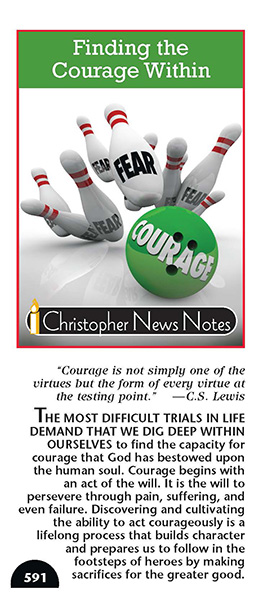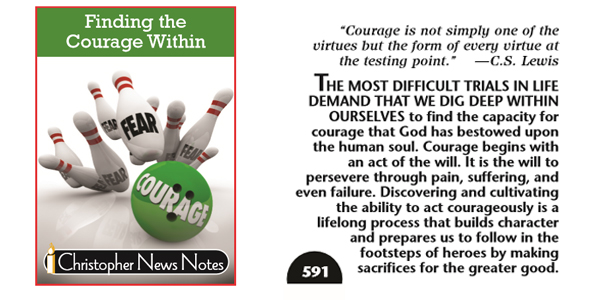Lenten Campaign 2025
This content is free of charge, as are all our articles.
Support us with a donation that is tax-deductible and enable us to continue to reach millions of readers.
“Courage is not simply one of the virtues but the form of every virtue at the testing point.” — C.S. Lewis
The most difficult trials in life demand that we dig deep within ourselves to find the capacity for courage that God has bestowed upon the human soul. Courage begins with an act of the will. It is the will to persevere through pain, suffering, and even failure. Discovering and cultivating the ability to act courageously is a lifelong process that builds character and prepares us to follow in the footsteps of heroes by making sacrifices for the greater good.
The Miracle of Father Kapaun
“We know that to accomplish anything good a person must make an effort; and making an effort is putting up a fight against the obstacles.” — Father Emil Kapaun
In November of 1950, the U.S. Army’s Third Battalion was overrun by Chinese forces in the Korean War Battle of Unsan. As two other battalions withdrew south, Army chaplain Father Emil Kapaun headed north into the thick of battle to minister to those being besieged on the front line.
In their Christopher Award-winning book “The Miracle of Father Kapaun,” reporters Roy Wenzl and Travis Heying write of the Battle of Unsan, “GIs saw Kapaun running from foxhole to foxhole, dragging wounded out, saying prayers over the dying, hearing confessions amid gunfire, ripping open shirts to look at wounds. Men screamed at him to escape, but he ignored them.”
After being captured, Father Kapaun saved one wounded soldier’s life by carrying him along what would later be described as a “death march” to a prisoner-of-war camp. As a POW, Father Kapaun worked tirelessly to serve others, tending to their health, performing menial chores, boosting morale with humor (and sometimes defiant acts in the face of enemy brutality), and coming up with ingenious techniques for survival. And when food was scarce he shared what little he had with them, one day laying his meager portion before them, blessing it and saying, “Thank you, O Lord, for giving us food we can not only eat but share.”
The priest spoke against communist indoctrination and boldly led his men in prayer. Seeing him as a threat, his captors eventually killed him by bringing him to a “death house” for a final starvation.
Soon after Father Kapaun’s passing, Corporal Robert McGreevy, another man condemned to die in the “death house,” crawled to a corner and braced his hands against both walls. There, he prayed, “Father Kapaun, help me.” Wenzl and Heying write, “And then, for the first time in weeks, McGreevy stood up.”
All around the camp, the men began to rally, declaring that they owed Father Kapaun their survival for the countless sacrifices he made for them. McGreevy and many others did survive. In 1993, Pope John Paul II declared Father Kapaun a Servant of God, the first step on the path to canonization. And in 2013, he was posthumously awarded the Medal of Honor.
Father Kapaun’s life demonstrates that, even though courage is something we cultivate within ourselves, its ultimate purpose is found in the inspiration and service it allows us to provide others.
Strong at the Broken Places
“The world breaks everyone and afterward many are strong at the broken places.” This wisdom from Ernest Hemingway provides the opening line for Richard M. Cohen’s book “Strong at the Broken Places,” which chronicles the lives of five people in their struggles with chronic illness. One of those people is Ben Cumbo.
Diagnosed with Duchenne muscular dystrophy as a child, doctors presented this debilitating disease to his parents as a grim death sentence. But instead of giving up, they chose to inspire their son to pursue his dreams.
At first, he dreamed of becoming a fireman, a policeman, a railroad conductor, or a pilot. Cohen writes, “Dreaming allowed the young man to see a future, to be able to imagine in the midst of high emotion and confusion over where he might be headed.” Then he adds, “What the boy would reach for became more realistic through the years.”
Ben’s family got involved in the local chapter of the Muscular Dystrophy Association, and at the age of eight, young Ben began to do advocacy work. Regarding the role he played as an advocate, Ben said, “I learned about going out of my way to help others and trying to change things.”
Ben developed a talent for writing. In high school, he wrote many short stories revolving around military themes, which helped him explore his childhood dreams of heroism. In an interview conducted by Cohen at the time, Ben reflected on the strength of will and intellect that evolved out of his physically weakened state, saying, “If one sense is taken away, others are heightened. That is beginning to happen to me.”
While he was in college, Ben’s mother, Debi, was diagnosed with lupus, a debilitating autoimmune disease. Ben was still battling his own personal demons of self-doubt, experiencing particular frustration with the distance he felt his wheelchair placed between himself and his peers. But he put his cares aside to reach out to his mom and guide her along the road of suffering he knew so well.
Talking about the weight that descended upon their family during that time and the calming effect Ben had on her, Debi said, “Ben preached to me what I had preached for so long to him. ‘Things are not that bad.’ We talked a lot, and sometimes we cried together…It was good to have that kind of soul mate.”
In 2015, Ben graduated from George Washington University with a Master’s degree in International Studies. He intended to seek employment within the U.S. intelligence community. But on April 22, 2015, shortly after graduation, Ben passed away at the young age of 27. The life he led remains an enduring testament to the power of the human will, and he demonstrates for us all how courage is born from a spirit of hope. God can give us the strength to face the most difficult challenges in life. Responding with hope is the first act of courage, and never giving up is what makes people like Ben Cumbo real-life heroes.
‘Our Most Powerful Weapons’
“Happiness depends on being free, and freedom depends on being courageous.” — Thucydides
On October 9, 2012, 15-year-old Malala Yousafzai, a Pakistani activist for female education, was shot in the head by a Taliban gunman. The bullet hit her in the forehead and traveled downward, eventually lodging itself near her shoulder blade.
The Taliban targeted Malala because she criticized their reign of terror in the Swat Valley, which included murder, vicious public beatings, the bombing of schools, and the intimidation of young women pursuing an education. In 2008, when she was just 11 years old, she gave a speech to a local press club and questioned publicly, “How dare the Taliban take away my basic right to education?”
In her book “I Am Malala,” she recalls a time before the shooting when her father, an education activist himself, suggested they go into “hibernation” to protect her from harm. “How can we do that?” she replied. “You were the one who said if we believe in something greater than our lives, then our voices will only multiply even if we are dead. We can’t disown our campaign!”
In the aftermath of the shooting, an emergency surgery saved Malala’s life, and she was flown to Queen Elizabeth Hospital in England to recuperate as the world prayed and hung on every bit of news about her condition. She regained consciousness and began to walk again, but surgeries were still needed to address multiple problems, including the fact that the left side of her face remained paralyzed.
Recalling the concern her parents displayed over the loss of her beautiful smile, she writes: “I reassured my mother that it didn’t matter to me if my face was not symmetrical. Me, who had always cared about my appearance, how my hair looked! But when you see death, things change. ‘It doesn’t matter if I can’t smile or blink properly,’ I told her. ‘I’m still me, Malala. The important thing is God has given me my life.’”
On her sixteenth birthday, after months of recuperation, including surgery that provided 86 percent recovery to her damaged facial nerves, Malala addressed the United Nations on the importance of education for every child. She said she was speaking to “all people living in poverty, those children forced to work and those who suffer from terrorism or lack of education” when she declared, “Let us pick up our books and our pens. They are our most powerful weapons. One child, one teacher, one book and one pen can change the world.”
Malala’s courage in the face of tyranny and oppression is a testament to the strength God inspires in our hearts when we stand for a just cause. When our cause is bigger than ourselves, God will empower us to find the right words and take the right actions.
Famous Thoughts on Courage ■ “Courage is resistance to fear, mastery of fear, not absence of fear.” — Mark Twain ■ “Success is never final, failure is never fatal. It’s courage that counts.” — John Wooden ■ “Inaction breeds doubt and fear. Action breeds confidence and courage. If you want to conquer fear, do not sit home and think about it. Go out and get busy.” — Dale Carnegie ■ “To have courage for whatever comes in life — everything lies in that.” — St. Teresa of Ávila ■ “Courage is what it takes to stand up and speak; courage is also what it takes to sit down and listen.” – Winston Churchill
(The above text is the Christopher News Note “Finding the Courage Within,” which was written by a freelancer. To receive a pdf or mailed copy – or to subscribe to Christopher News Notes via email or snail mail – send your request to radio@christophers.org.


